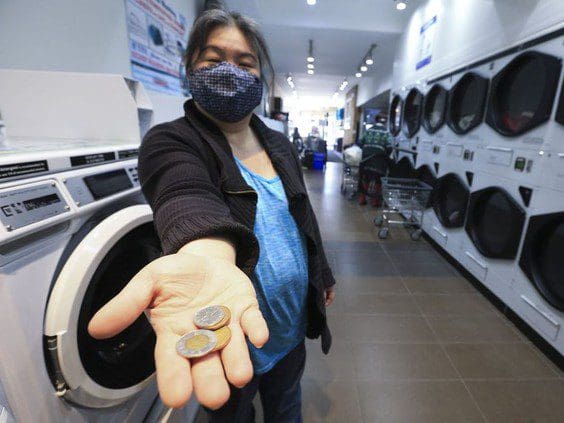Opinion by Tarek Fatah
The sight of the homeless sleeping on sidewalks in below-freezing temperatures is not an uncommon sight for those of us who call the downtown core of Canada’s major cities our home. However, a new category of the poor is emerging in our neighbourhoods.
Imagine having to choose between milk for your children and getting your clothes cleaned at the laundromat. This is not a theoretical scenario; it is a fact of life.
In January, Nancy Seto, owner-operator of the Yummi Cafe Laundromat in Toronto noticed a regular customer who had done his washing but was not drying them.
When she asked the customer why he wasn’t drying his large pile of clothes, the man told her he had to choose between using the dryer and buying milk for his kids. “I felt so bad that I offered to cover the cost,” Seto told CBC Toronto.
Since that incident, Seto and her husband have opened up their laundromat inviting people hiding in poverty to wash and dry their clothes for free. No questions asked.
The pandemic has caused great damage to the world economy, devastating the dignity and self-respect of millions who have lost their jobs or have become redundant in the new economy that is rising from the ashes of a world we once knew.
Individual charity and kindness of citizens towards strangers may be noble deeds, but compassion alone never offered a solution to the challenges of a society divided by wealth. Ask Mother Teresa.
Only state intervention — be it in education, healthcare or social services – can level the playing field and accord some degree of dignity to the less fortunate.
Yes, I use the word “less fortunate” because not everyone is able to inherit some of the trillions that are being inherited by the children of the baby-boomer generation — wealth from their parents for work they never did.
Thankfully, there is a way out and there are people willing to act to create a more equitable society.
Their plan is to introduce the concept of a Universal Basic Income (UBI) at the upcoming federal Liberal convention in April.
The initiative was first put into motion by MP Julie Dzerowicz, who in February introduced Private Members Bill C-273 — An Act to establish a national strategy for a guaranteed basic income.
Introducing her bill, Dzerowicz disclosed, some ministers in Prime Minister Justin Trudeau’s cabinet were “very supportive” of her initiative. According to a Huffington Post story:
“The realities of work are changing faster than ever, Dzerowicz said, adding an observation that more workers are shifting to the gig economy, making temporary short-term work increasingly common. Future job security is also being threatened by automation and artificial intelligence.”
As Canadian Press reports: “The idea of creating a universal basic income is being pushed by Liberal MPs and grassroots party members, young and old, from east to west — and is among the top priority issues chosen for debate at the governing party’s April 9-10 convention.”
To those who say UBI is a left-wing conspiracy, allow me to list those who have backed the concept:
1. Elon Musk and Mark Zuckerberg. Musk suggests it will become necessary as automation eliminates jobs, while the Facebook CEO sees it as a way to give people a safety net to support entrepreneurship
2. 100 Canadian CEOs, who in 2018 urged Premier Doug Ford to rescue Ontario’s basic income project.
3. The United Church of Canada believes, “A [basic income] program would help provide an adequate living level for everyone and address the persistent inequities within our country.”
4. Pope Francis, who wrote after the coronavirus pandemic, “This may be the time to consider a universal basic wage.
5. The Anglican Church of Canada.
With the NDP already committed to UBI, a Liberal initiative in this direction may very well end the hopes of Conservative leader Erin O’Toole and mean another term for Prime Minister Justin Trudeau.
_____
To see original article please visit: https://torontosun.com/opinion/columnists/fatah-free-laundromats-or-universal-basic-income/wcm/fd98ce78-db27-4dca-a7a4-aaa01c3aa533/




















